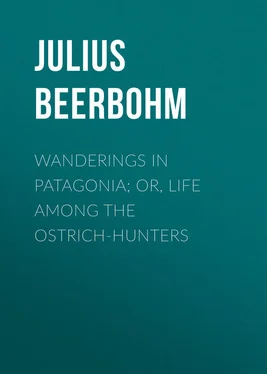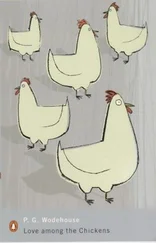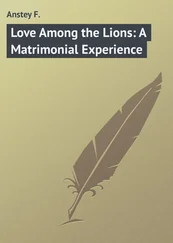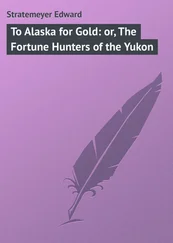Julius Beerbohm - Wanderings in Patagonia; Or, Life Among the Ostrich-Hunters
Здесь есть возможность читать онлайн «Julius Beerbohm - Wanderings in Patagonia; Or, Life Among the Ostrich-Hunters» — ознакомительный отрывок электронной книги совершенно бесплатно, а после прочтения отрывка купить полную версию. В некоторых случаях можно слушать аудио, скачать через торрент в формате fb2 и присутствует краткое содержание. Жанр: foreign_antique, foreign_prose, Путешествия и география, на английском языке. Описание произведения, (предисловие) а так же отзывы посетителей доступны на портале библиотеки ЛибКат.
- Название:Wanderings in Patagonia; Or, Life Among the Ostrich-Hunters
- Автор:
- Жанр:
- Год:неизвестен
- ISBN:нет данных
- Рейтинг книги:4 / 5. Голосов: 1
-
Избранное:Добавить в избранное
- Отзывы:
-
Ваша оценка:
- 80
- 1
- 2
- 3
- 4
- 5
Wanderings in Patagonia; Or, Life Among the Ostrich-Hunters: краткое содержание, описание и аннотация
Предлагаем к чтению аннотацию, описание, краткое содержание или предисловие (зависит от того, что написал сам автор книги «Wanderings in Patagonia; Or, Life Among the Ostrich-Hunters»). Если вы не нашли необходимую информацию о книге — напишите в комментариях, мы постараемся отыскать её.
Wanderings in Patagonia; Or, Life Among the Ostrich-Hunters — читать онлайн ознакомительный отрывок
Ниже представлен текст книги, разбитый по страницам. Система сохранения места последней прочитанной страницы, позволяет с удобством читать онлайн бесплатно книгу «Wanderings in Patagonia; Or, Life Among the Ostrich-Hunters», без необходимости каждый раз заново искать на чём Вы остановились. Поставьте закладку, и сможете в любой момент перейти на страницу, на которой закончили чтение.
Интервал:
Закладка:
I found the nest to be of the roughest description, being simply a hole scooped in the ground, under shelter of a bush, and made soft for the young chicks by a few wisps of grass.
The number of eggs found in a nest varies from ten to forty, being usually about twenty. In size the Patagonian ostrich's egg is equal to about eight hen's eggs. It is the male bird that hatches the eggs and looks after the young – being, I believe, the only male among birds which does so. The period of incubation is from twenty to twenty-four days. During rainy weather he never leaves the nest, but will sit for six or seven days without feeding. In fine weather he grazes for an hour or two in the evening, but never strays far from the nest, as Master Reynard, who is always prowling near, would soon make a raid on the eggs. It is said that if one egg is broken or abstracted from the nest during the absence of the male bird, on returning he will immediately detect the theft, and become so furious that he will dash the remaining eggs to pieces, and dance round the nest as if frantic.
After the hatching period, the birds lay their eggs promiscuously about the plains. These eggs are called 'huatchos' by the natives. They keep for a long time, and I have frequently met with huatchos in April, which, although they must have been laid more than six months at that time, were still fairly eatable.
The ostrich of Southern Patagonia ( Rhea Darwinii ) is smaller than the 'Avestruz moro' ( Rhea Americana ), as the species which frequents the country near the River Negro is called by the natives. The colour of its plumage is brown, the feathers being tipped with white, whereas the moro, as its name indicates, is uniformly grey. The R. Darwinii are extremely shy birds, and as their vision is remarkably acute, it is by no means an easy matter to catch them, unless one has very swift dogs to hunt with.
At the approach of danger the ostrich often crouches flat on the ground, with its neck stretched out under the grass, remaining motionless in this position till the dogs have gone past. This stratagem is successful when the wind is blowing against the scent; but when the contrary is the case, the dogs soon discover the hiding bird, which, doubtless too bewildered by the sudden failure of its naïvely artless ruse, makes no attempt to escape.
Our companions by this time were a long way ahead of us, so we started after them at a brisk gallop. On the way we met Isidoro, who had also been fortunate, as two ostriches dangling from each side of his saddle evinced.
We continued our journey along the winding ravine, all helping now to drive the horses and keep them well together – an essential matter when rapid progress is desirable, for if the troop once gets broken up and scattered, one may spend no end of time in galloping about and herding the horses together again.
At about five o'clock we passed a fine thick bush, of considerable height, which appeared so well adapted for affording shelter, that we resolved to camp under it for the night, especially as I, not being accustomed lately to such long rides, already began to feel rather tired and shaken.
In a few minutes after we had made this decision our horses were unsaddled, the saddle-gear, packs, ostriches, etc., thrown higgledy-piggledy in a heap, and everyone lay down in the grass to stretch his limbs and smoke a pipe – a simple indulgence which, under such circumstances, becomes an absolutely priceless luxury.
A small fire was then made, the kettle filled from the rivulet which ran down the centre of the ravine, and as soon as the water boiled, maté was prepared, and we sat for some time silently imbibing that stimulating concoction, whose wonderful powers of banishing fatigue I have already alluded to.
Presently Maximo and Guillaume went off to collect firewood, whilst Isidoro and Garcia busied themselves with plucking the ostriches and laying the feathers in bundles, in which form they enter the market. I stretched myself out on my furs and awaited the dinner-hour with eager expectation, as my ride and that sharp, dry air peculiar to Patagonia had given me the real pampa appetite, under the influence of which one becomes so inordinately and irksomely ravenous, and experiences such an unnatural craving for food, as quite to justify one in considering one's self attacked by some transitory, but acute disease which has to be undergone by the stranger in Patagonia, like those acclimatising fevers peculiar to some tropical countries.
In an hour or so Guillaume and Maximo returned, bringing a huge bundle of dry wood between them, and the kitchen being Maximo's special department, he immediately set about getting dinner ready. Thanks to his efforts, a fine fire was soon blazing; the big iron pot was filled with water, ostrich meat, and rice, and set to boil, and several other dainties were set to roast on wooden spits or broiled in the ashes, emitting odours of grateful promise as they sputtered and browned under Maximo's delicate handling.
Meanwhile, we sharpened our knives, took up comfortable positions round the fire, and the chêf having declared everything ready, the onslaught commenced.
I append the carte for the benefit of those curious in such matters:
Pot-au-feu (rice, ostrich meat, etc.).
Broiled ostrich wings.
Ostrich steak.
Cold guanaco head.
Roast ostrich gizzard, à l'Indienne .
Ostrich eggs.
Custard (ostrich eggs, sugar, gin).
A glance at the above will show that a pampa dinner may be pleasantly varied. Of the items mentioned, I think the ostrich wings are the greatest delicacy, tasting something like turkey, and, as I then thought at least, perhaps even finer. The ostrich gizzard, too, was worthy of note, being broiled Indian fashion, with hot stones – a task which, as requiring great care, was superintended by Isidoro himself, who in his way was a remarkable cook. The flavour of ostrich meat generally is not unpleasant, especially when fat. It varies greatly, according to what part of the bird it is from. The wings, breast, and extremity of the back are the tit-bits. The thighs are coarser, and bear a close resemblance to horseflesh.
When all the meat was consumed, Isidoro, who, by-the-bye, seemed to be able to produce anything that was required from somewhere or other (generally from his cap, which was quite a storehouse for all kinds of extraneous articles), now turned up with a small soup-plate and a dilapidated spoon, and I was requested to help myself to the broth and rice in the pot, handing the plate back to Isidoro when I had finished, who in his turn passed it to Garcia, and so on till it had gone round the circle.
We then lay back to smoke and recover from our exertions, whilst the dogs cleared up whatever fragments remained from the feast.
Here I may say a few words about the dogs, of which there were in all about eighteen with us. Most of them were greyhounds, of more or less pure breeds, imported by the Welsh settlers at Chubut; the others being nondescript curs of heavier build, which were useful for pulling down the guanacos brought to bay by the fleeter but less powerful greyhounds. Their various merits and failings formed the usual topic of an evening's conversation, their owners comparing notes as to their respective achievements during the day's hunting, or recalling previous wonderful performances worthy of remembrance.
We were quite overrun by such a number of dogs, and often they became a nuisance only to be borne when we remembered that after all they were the meat-givers, without whom we should find ourselves in a very unpleasant plight. They had a peculiarly happy knack, when wet, of creeping into one's furs, and making one's bed damp for the night; and often I have been awakened by one of them trying to go comfortably to sleep on the pillow beside me, and thrusting its cold nose into my face as a preliminary. When eating, if I happened to lay down a piece of meat for a moment, it was sure to be immediately snapped up by one of them, and they would even snatch away the morsel held in my hand, if I did not take care to keep them at a safe distance. All provisions had to be put on the top of a bush, well out of their reach, as neglect in this particular might bring on the unpleasant alternative of going supperless to bed.
Читать дальшеИнтервал:
Закладка:
Похожие книги на «Wanderings in Patagonia; Or, Life Among the Ostrich-Hunters»
Представляем Вашему вниманию похожие книги на «Wanderings in Patagonia; Or, Life Among the Ostrich-Hunters» списком для выбора. Мы отобрали схожую по названию и смыслу литературу в надежде предоставить читателям больше вариантов отыскать новые, интересные, ещё непрочитанные произведения.
Обсуждение, отзывы о книге «Wanderings in Patagonia; Or, Life Among the Ostrich-Hunters» и просто собственные мнения читателей. Оставьте ваши комментарии, напишите, что Вы думаете о произведении, его смысле или главных героях. Укажите что конкретно понравилось, а что нет, и почему Вы так считаете.












